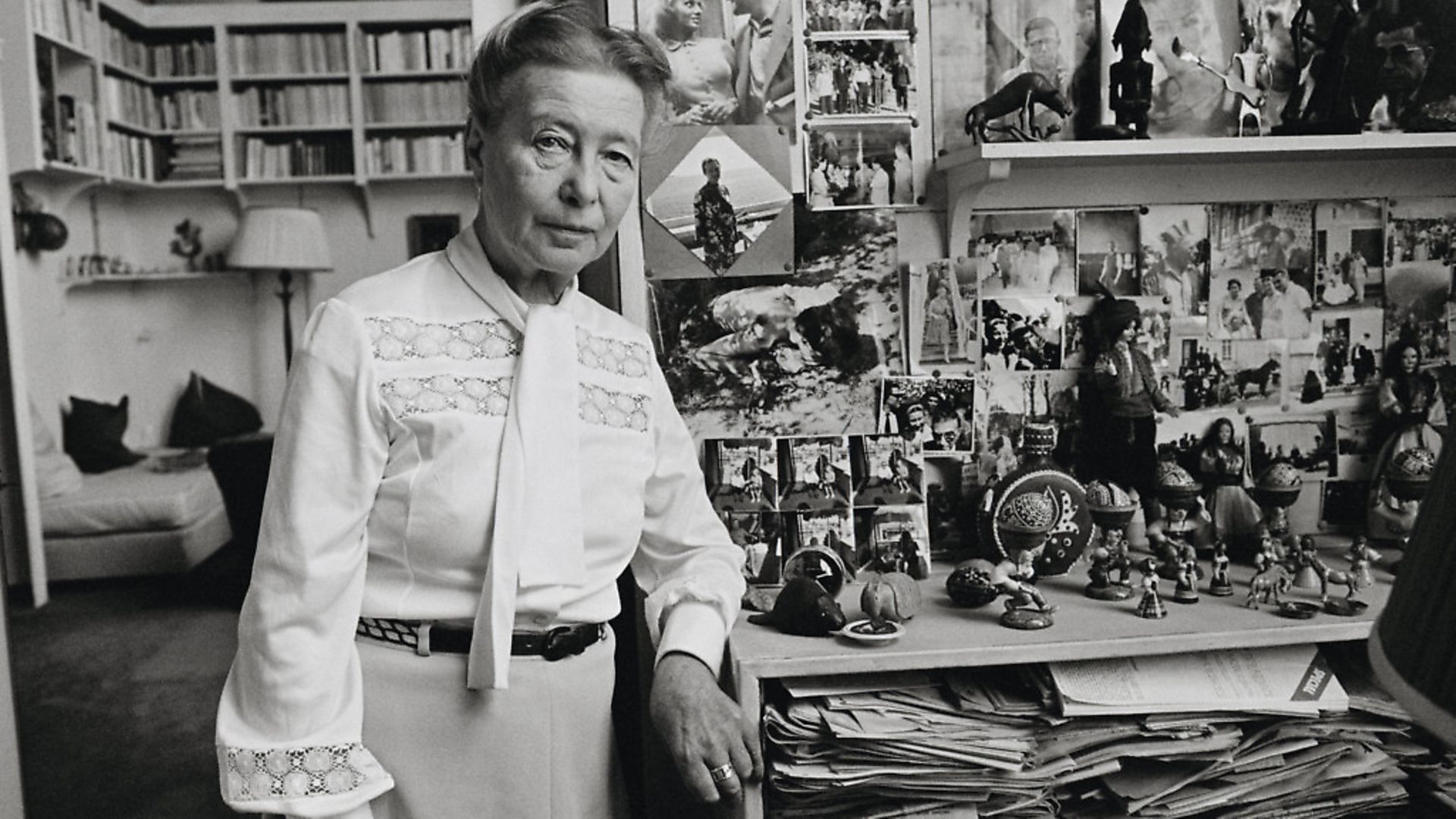CHARLIE CONNELLY examines the life of Simone de Beauvoir, author of The Second Sex.
Maybe it was a feeling of release after so long under a repressive regime, a sense of shackles coming off, but the years after the liberation of France were prolific ones for Simone de Beauvoir. Her novel Le Sang des autres (‘The Blood of Others’) was published in 1945 followed by Tous les hommes sont mortels (‘All Men Are Mortal’) a year later. Pour une morale de l’ambiguïté (‘The Ethics of Ambiguity’), a philosophical treatise written partly in response to her partner Jean-Paul Sartre’s L’Être et le néant (‘Being and Nothingness’), followed in 1947 by which time she had already commenced writing the work that would define her career and become the lodestone of modern feminism.
Writing about the self was a novelty in the middle of the 20th century. The surrealist Michel Leiris had published L’Age d’homme in 1939, a groundbreaking autobiographical work that delved deep into the author’s psyche while containing a tangible streak of self-mockery, but a book by a woman analysing what it meant to be a woman from a first-person point of view had never been done. Indeed, the prospect of such a book was so unlikely as to be almost unimaginable: women in France had only been enfranchised in 1944, birth control would remain illegal for another two decades and abortions until as late as 1975. The level of marginalisation de Beauvoir endured socially, culturally and economically is almost unthinkable today.
Despite this, Beauvoir began to think about writing a confessional book, a philosophical memoir that would by extension examine women’s place in the world from a woman’s perspective. It was an ambitious project.
‘I had never had any feeling of inferiority; no one had ever said to me, ‘You think that way because you are a woman”, she mused. ‘My femaleness had never bothered me in any way.’
Have your say
Send your letters for publication to The New European by emailing letters@theneweuropean.co.uk and pick up an edition each Thursday for more comment and analysis. Find your nearest stockist here or subscribe to a print or digital edition for just £13. You can also join our readers’ Facebook group to keep the discussion and debate going with thousands of fellow pro-Europeans.
Sartre encouraged her to think deeper about the issue, about her own experience and how it chimed with that of women across the world. When she delved into the subject and began to process it philosophically, shedding as much of a lifetime of patriarchal conditioning as she could, de Beauvoir astounded even herself.
‘It was a revelation,’ she would recall. ‘This world was a masculine world. My childhood was nourished by myths concocted by men and I hadn’t reacted to them in the same way I should have done if I had been a boy. I became so interested that I gave up the project of a personal confession in order to focus on women’s condition in general.’
It took just over a year to produce Le Deuxième Sexe, (‘The Second Sex’), a work that displayed extraordinary depth of research and clarity of thinking, especially considering that during the 14-month window in which she wrote it she also travelled to the US and produced a journal of the visit L’Amérique au jour le jour (‘America Day By Day’), not to mention commencing a passionate affair with the American writer Nelson Algren.
Le Deuxième Sexe was informed, unprecedented, erudite and so comprehensive it had to be divided into separate volumes. The first book, Les faits et les mythes (‘Facts and Myths’), appeared in June 1949, selling 22,000 copies in the first week alone, while L’expérience vécue (‘Lived Experience’) followed in November, more autobiographical, more opinionated, exploring aspects of a woman’s life that were never discussed.
‘One is not born, but rather becomes a woman,’ she wrote, going on to define the perception of her sex that had always deprived women of agency.
‘She is a womb, an ovary; she is a female – this word is sufficient to define her.’
If the first book, which set out Beauvoir’s research, caused a sensation, the second, which interpreted that research through a mixture of her lived experience and philosophy, astounded readers and critics alike, not necessarily in a positive way. The Vatican condemned it while Albert Camus denounced de Beauvoir for, as he saw it, ridiculing the French male.
‘Professors hurled the book across the room,’ she recalled. ‘People sniggered at me in restaurants. The fact that I had spoken about female sexuality was absolutely scandalous at the time. Men kept drawing attention to the vulgarity of the book, essentially because they were furious at what the book was suggesting – equality between the sexes.’
For all her achievements in expressing the oppression under which women laboured, this independent thinker and writer, a woman who exploded the norms of the patriarchal society, has come to be known as much for her relationship with Sartre as for her work. She was 21 when they met for the first time and already making a name for herself as a philosophy student at the Sorbonne. He was three years her senior and doing likewise at the Ecole Normale Supérieure. In 1929 both were sitting the agrégation, a competitive national philosophy examination in which success guaranteed an academic career for life, and were part of the same small study group. At their first meeting she explained Leibniz to him in a way that opened up the philosopher’s work to a level of understanding Sartre had never achieved before.
When the national agrégation results were published Sartre came first and Beauvoir, the youngest student ever to sit the exam and only the ninth woman ever to pass, was one place behind. Later the examiners conceded that she was clearly the better philosopher but Sartre was placed top because he was attempting it for the second time. The most significant outcome of the 1929 agrégation, however, was how it brought together two of the most remarkable minds of the French 20th century, enmeshing them romantically and academically for the rest of their lives. Theirs was a liberated, modern relationship. Both openly enjoyed romantic liaisons outside the relationship, none of which threatened the bond they had.
‘One single aim fired us, the urge to embrace all experience, and to bear witness concerning it,’ she wrote. ‘At times this meant that we had to follow diverse paths without concealing even the least of our discoveries from one another. When we were together, we bent our wills so firmly to the requirements of this common task that even at the moment of parting we still thought as one. That which bound us freed us; and in this freedom we found ourselves bound as closely as possible.’
They never lived together. Indeed, beyond a brief period after the liberation in which they lived on separate floors of the same boarding house, they never lived in the same building. Throughout their lives they addressed each other by the formal vous rather than more personal tu.
‘We have pioneered our own relationship,’ wrote de Beauvoir, ‘with its freedom, intimacy and frankness.’
She was born into a privileged Catholic family in Paris. Her father was an assistant to a leading Parisian lawyer while her mother came from a family on the fringes of nobility: she’d never known a life without domestic servants until Georges de Beauvoir went bankrupt after the First World War. Not only did this mean Simone’s mother had to learn to cook and sew, the couple’s hopes that their two daughters would marry into French high society were dashed. Simone and her younger sister Hélène would have to earn their own livings.
‘I was freed,’ said de Beauvoir. ‘It’s financial independence that counts. To earn one’s living is not an end in itself but it is the only way to achieve securely based inner independence.’
It was a limited liberation but it allowed de Beauvoir to explore her intelligence and creativity to the full. As well as the existential philosophy for which she became famous, her fiction was so good that in 1954 she was awarded the Prix Goncourt, France’s highest literary honour, for her novel Les Mandarins.
In later life Le Deuxième Sexe and her relationship with Sartre came under fire from the new wave of feminists that emerged in the 1960s but de Beauvoir remained unrepentant and unapologetic to the end. ‘I said all I had to say about the condition of women when I wrote Le Deuxième Sexe,’ she said in an interview towards the end of her life.
‘That was it, my feminist book. I made my statement, then I had my life to live and I lived it as I wanted, not as a group of feminists would have wished. I’m sorry if I disappointed them, but it’s my life and I live it, I don’t freeze it into an object according to other people’s wishes.’











